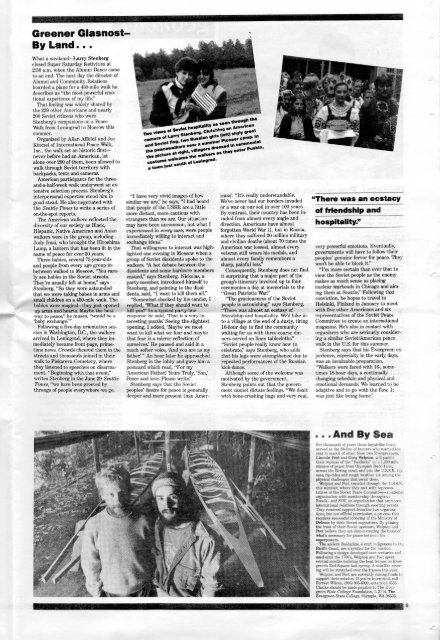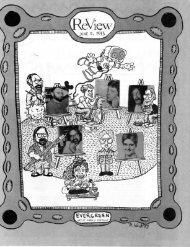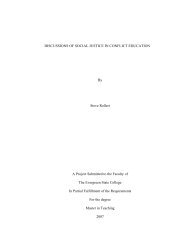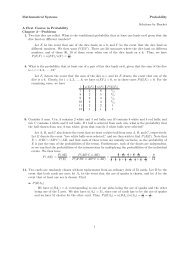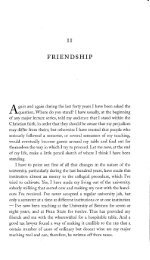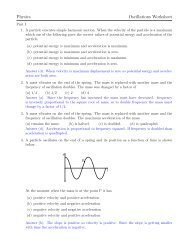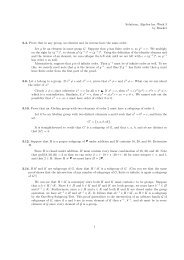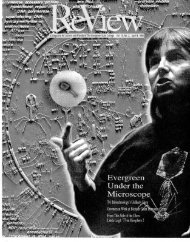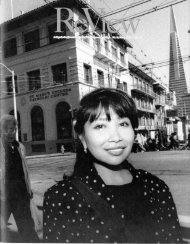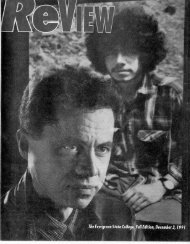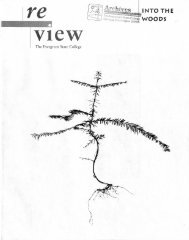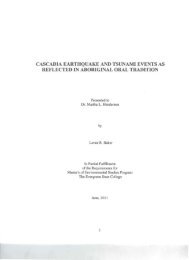V9 #1 November 1987 - Archives - The Evergreen State College
V9 #1 November 1987 - Archives - The Evergreen State College
V9 #1 November 1987 - Archives - The Evergreen State College
You also want an ePaper? Increase the reach of your titles
YUMPU automatically turns print PDFs into web optimized ePapers that Google loves.
Greener<br />
By Land. . .<br />
What a weekend—Larry Stenberg<br />
closed Super Saturday festivities at<br />
2:30 a.m. when the Alumni Dance came<br />
to an end. <strong>The</strong> next day the director of<br />
Alumni and Community Relations<br />
boarded a plane for a 450-mile walk he<br />
describes as "the most powerful emotional<br />
experience of my life."<br />
That feeling was widely shared by<br />
the 229 other Americans and nearly<br />
200 Soviet citizens who were<br />
Stenberg's companions on a Peace<br />
Walk from Leningrad to Moscow this<br />
summer.<br />
Organized by Allan Affeldt and Joe<br />
Kinczel of International Peace Walk,<br />
Inc.. the walk set an historic first—<br />
never before had an American, let<br />
alone over 200 of them, been allowed to<br />
walk through Soviet territory with<br />
backpacks, tents and cameras.<br />
American participants for the threeand-a-half-week<br />
walk underwent an extensive<br />
selection process. Stenberg's<br />
interpersonal expertise stood him in<br />
good stead. He also negotiated with<br />
the Seattle Times to write a series of<br />
on-the-spot reports.<br />
<strong>The</strong> American walkers reflected the<br />
diversity of our society as Black,<br />
Hispanic, Native American and Asian<br />
walkers were in the group, including<br />
Judy Imai, who brought the Hiroshima<br />
Lamp, a lantern that has been lit in the<br />
name of peace for over 20 years.<br />
Three babies, several 75-year-olds<br />
and people from every age group inbetween<br />
walked to Moscow. "You rarely<br />
see babies in the Soviet streets.<br />
<strong>The</strong>y're usually left at home," says<br />
Stenberg. "So they were astounded<br />
that we were taking babes in arms and<br />
small children on a 450-mile walk. <strong>The</strong><br />
babies were magical—they just opened<br />
up arms and hearts. Maybe the best<br />
way to peace," he muses, "would be a<br />
'baby exchange'"<br />
Following a five-day orientation session<br />
in Washington, D.C., the walkers<br />
arrived in Leningrad, where they immediately<br />
became front-page, primetime<br />
news. Crowds cheered them in the<br />
streets and thousands joined in their<br />
walk to Piskareva Cemetery, where<br />
they listened to speeches on disarmament.<br />
"Beginning with that event,"<br />
writes Stenberg in the June 29 Seattle<br />
Times, "we have been greeted by<br />
throngs of people everywhere we go.<br />
"I have very vivid images of how<br />
similar we are," he says, "I had heard<br />
that people of the USSR are a little<br />
more distant, more cautious with<br />
strangers than we are. Our situation<br />
may have been uncommon, but what I<br />
experienced in every case, were people<br />
immediately willing to interact and<br />
exchange ideas."<br />
That willingness to interact was highlighted<br />
one evening in Moscow when a<br />
group of Soviet dissidents spoke to the<br />
walkers. "A hot debate between the<br />
dissidents and some hardcore members<br />
ensued," says Stenberg. Nickolas, a<br />
party-member, introduced himself to<br />
Stenberg, and pointing to the dissidents,<br />
said, "I want to kill them all."<br />
"Somewhat shocked by his candor, I<br />
replied, What if they should want to<br />
kill you?' In a typical party-line<br />
response he said, "That is a very interesting<br />
puzzle' Seeing the slightest<br />
opening, I added, 'Maybe we most<br />
want to kill what we fear and maybe<br />
that fear is a mirror reflection of<br />
ourselves.' He paused and said in a<br />
much softer voice, 'And you are as my<br />
father.'" An hour later he approached<br />
Stenberg in the lobby and gave him a<br />
postcard which read, "For my<br />
'American Father,' Yours Truly, 'Son,'<br />
Peace and love Please write"<br />
Stenberg says that the Soviet<br />
peoples' desire for peace is generally<br />
deeper and more present than Amer-<br />
icans'. "It's really understandable.<br />
We've never had our borders invaded<br />
or a war on our soil in over 100 years.<br />
By contrast, their country has been invaded<br />
from almost every angle and<br />
direction. Americans have almost<br />
forgotten World War II, but in Russia,<br />
where they suffered 20 million military<br />
and civilian deaths (about 70 times the<br />
American war losses), almost every<br />
veteran still wears his medals, and<br />
almost every family remembers a<br />
sharp, painful loss."<br />
Consequently, Stenberg does not find<br />
it surprising that a major part of the<br />
group's itinerary involved up to four<br />
ceremonies a day at memorials to the<br />
"Great Patriotic War."<br />
"<strong>The</strong> graciousness of the Soviet<br />
people is astonishing," says Stenberg.<br />
"<strong>The</strong>re was almost an ecstasy of<br />
friendship and hospitality. We'd hike into<br />
a village at the end of a dusty, tiring<br />
16-hour day to find the community<br />
waiting for us with three-course dinners<br />
served on linen tablecloths."<br />
"Soviet people really know how to<br />
celebrate," says Stenberg, who adds<br />
that his legs were strengthened due to<br />
repeated performances of the Russian<br />
kick-dance<br />
Although some of the welcome was<br />
motivated by the government,<br />
Stenberg points out that the government<br />
cannot dictate feelings. "We dealt<br />
with bone-crushing hugs and very real,<br />
<strong>The</strong>re was an ecstacy<br />
off friendship and<br />
hospitality."<br />
very powerful emotions. Eventually,<br />
governments will have to follow their<br />
peoples' genuine fervor for peace <strong>The</strong>y<br />
won't be able to block it."<br />
"I'm more certain than ever that to<br />
view the Soviet people as the enemy<br />
makes as much sense as placing<br />
nuclear warheads in Chicago and aiming<br />
them at Seattle." Following that<br />
conviction, he hopes to travel to<br />
Helsinki, Finland in January to meet<br />
with five other Americans and six<br />
representatives of the Soviet Peace<br />
Committee to create an international<br />
magazine. He's also in contact with<br />
organizers who are seriously considering<br />
a similar Soviet/American peace<br />
walk in the U.S. for this summer.<br />
Stenberg says that his <strong>Evergreen</strong> experience,<br />
especially in the early days,<br />
was an invaluable preparation.<br />
"Walkers were faced with 16-, sometimes<br />
18-hour days, a continually<br />
changing schedule and physical and<br />
emotional demands. We learned to be<br />
adaptive and to go with the flow. It<br />
was just like being home."<br />
.. . And By Sea<br />
For thousands of years these kayak-like boats<br />
served as the lifeline of hunters who roamed the<br />
seas in search of otter. Now, two <strong>Evergreen</strong>ers,<br />
Lincoln Post and Greg Welpton, will paddle<br />
their replicas of the "Baidarka" on a 1,200 mile<br />
mission of peace from Olympia's Budd Inlet,<br />
across the Bering strait and into the U.S.S.R. Icy<br />
seas, rip-tides and rough weather are among the<br />
physical challenges that await them.<br />
Welpton and Post traveled through the U.S.S.R.<br />
this summer, where they met with representatives<br />
of the Soviet Peace Committee—a national<br />
organization with membership throughout<br />
Russia—and SOV, an organization that promotes<br />
international relations through sporting events.<br />
<strong>The</strong>y received support from the two organizations,<br />
but not official permission, a process that<br />
requires successful lobbying of the Ministry of<br />
Defense by their Soviet supporters. By gaining<br />
the trust of their Soviet sponsors, Welpton and<br />
Post believe they are demonstrating the basis of<br />
what's necessary for peace between the<br />
superpowers.<br />
<strong>The</strong> ancient Baidarkas, a craft indigenous to the<br />
Pacific Coast, are a symbol for the mission.<br />
Following a design developed over centuries and<br />
used until the 1700's, Welpton and Post spent<br />
several months building the boat frames on <strong>Evergreen</strong>'s<br />
Red Square last spring. A skin-like covering<br />
will be stretched over the frames this year.<br />
Welpton and Post are currently raising funds to<br />
support their mission. If you're interested, call<br />
Forrest Wilcox, (206) 866-6000, extension 6565.<br />
Checks should be made payable to <strong>The</strong> <strong>Evergreen</strong><br />
<strong>State</strong> <strong>College</strong> Foundation, L 3114, <strong>The</strong><br />
<strong>Evergreen</strong> <strong>State</strong> <strong>College</strong>, Olympia, WA 98505.


